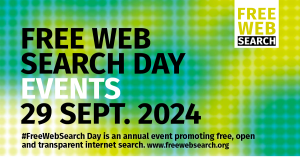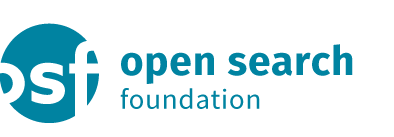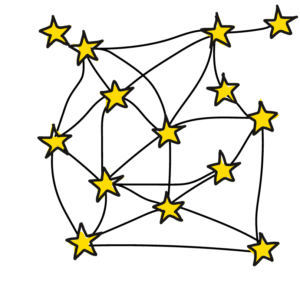 Freedom of information and democracy require open access to online resources. The #FreeWebSearch Day on 29 September brings this topic to the table bundling participatory actions online and offline.
Freedom of information and democracy require open access to online resources. The #FreeWebSearch Day on 29 September brings this topic to the table bundling participatory actions online and offline.
In 2023 the Open Search Foundation (OSF) brought to life the International #FreeWebSearchDay, which on 29 September each year stands for free and transparent internet search: Via the #FWSD website people are invited to participate and advocate for a free web.
“#FreeWebSearchDay unites all people wishing to stand up for free web search. Its main target is to support an open and transparent internet search. The action day highlights the strong influence internet search has on all of us – and why its freedom and transparency are key to our democracies”, says Christine Plote, co-founder and member of the board at OSF.
“For events surrounding 29 September 2024, we are looking for fellow campaigners from companies, schools, universities and civil society organisations. Therefore, we are collecting events, talks and actions across Europe around open internet search.”
Intransparent information: A core problem
#FreeWebSearch Day on 29 September is all about raising awareness for the overwhelming power of major search engine providers. Worldwide, about 90 percent of internet users trust Google when they search the internet for information they need for work, education, lifestyle, hobbies or purchases (Quelle: gs.Statcounter.com). However, these corporations do not disclose their search indexes or algorithms. They keep in the dark, firstly, how their results come about and, secondly, what criteria are used to list them. What it all comes down to: A few profit-oriented tech companies determine what information we build upon and thus shape public opinion.
Why web search requires our immediate attention
Search is not a private matter! The major search engines also hide what personal data they collect from users when they search and retrieve results. It is not clear how they store, use or market this personal data. All we know is that the data is processed for advertising purposes, because advertising is the search companies’ main business model. Pointing out these connections, drawing attention to the consequences of the existing lack of transparency in web search, a lack of privacy protection and, above all, highlighting alternative solutions are additional goals of the international #FreeWebSearch Day on 29 September.
“Many internet users still think that search results at the top of their results list are good, correct and trustworthy, even though they cannot know the criteria of the rankings,” states Christine Plote. However, freedom of information is the most important foundation of a functioning democracy. There is still a huge lack of knowledge on how search results come about and are ranked or how a search engine will know, what is in a picture. “Surprisingly, we seem to accept a high degree of digital illiteracy in this respect. Yet, it is high time that search and the evaluation of search results become part of the curricula of schools or universities, training and further education”, the co-founder of the OSF claims. In addition, schools and companies should give higher priority to hot topics, such as the impacts on online search by artificial intelligence, the new text generators or Large Language Models (LLMs).
Actions, lectures, hackathons: Ideas wanted
For #FreeWebSearch Day 2024 on 29 September contributions from as many different groups as possible are welcome: Companies, schools, universities, other educational institutions, museums or associations can contribute to with (online) lectures, discussions, participatory activities or projects. IT specialists or programmers can contribute with technical know-how and organise hackathons and more.
And everyone can help spread awareness by downloading and reposting our social media graphics and helping us spread the word.
Information and events on #FreeWebSearch Day on and around 29 September will be continuously updated at: www.FreeWebsearch.org

